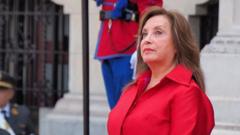A newly elected conservative coalition has sparked tensions in New Zealand, reversing major initiatives aimed at protecting Indigenous Māori rights and culture. Tens of thousands have protested in response, reflecting deep societal divisions.**
New Zealand Faces Cultural Division as Right-Wing Government Takes Charge**

New Zealand Faces Cultural Division as Right-Wing Government Takes Charge**
Protests erupt in New Zealand as the new government challenges Māori rights, marking a stark departure from Jacinda Ardern’s progressive policies.**
Tens of thousands gathered outside New Zealand’s Parliament on Tuesday in opposition to a controversial bill affecting Māori rights, a demonstration highlighting the cultural and political upheaval in the nation. The recent election has ushered in New Zealand's most conservative government in decades, steering the country away from the compassionate progressive policies championed by former Prime Minister Jacinda Ardern.
The newly formed coalition government, composed of the center-right party and two populist groups, has quickly moved to dismantle several key policies instituted during Ardern's tenure. These changes include the repeal of the country's ambitious ban on smoking for future generations and a retraction of climate change regulations. Additionally, leadership within the government has seen the appointment of a former arms-industry lobbyist to review stringent gun laws.
In a significant departure from its history of promoting Māori culture and safeguarding the rights of the Indigenous population, the new government’s actions have caused concern and unrest within communities. Indigenous Māori leaders, like Debbie Ngarewa-Packer, co-leader of the Te Pāti Māori party, articulated the need to defend their existence, emphasizing the importance of their traditional identities amid a backdrop of increasing marginalization.
This rightward shift can be related to the complexities of Ardern’s legacy. While her handling of the coronavirus pandemic initially earned widespread praise, it later became a source of division, particularly as the nation grappled with high inflation rates, which peaked at 7% prior to her departure from office in January 2023. As the country navigates this transition, the protests signal an urgent call for justice and recognition amidst New Zealand's complicated socio-political landscape.




















